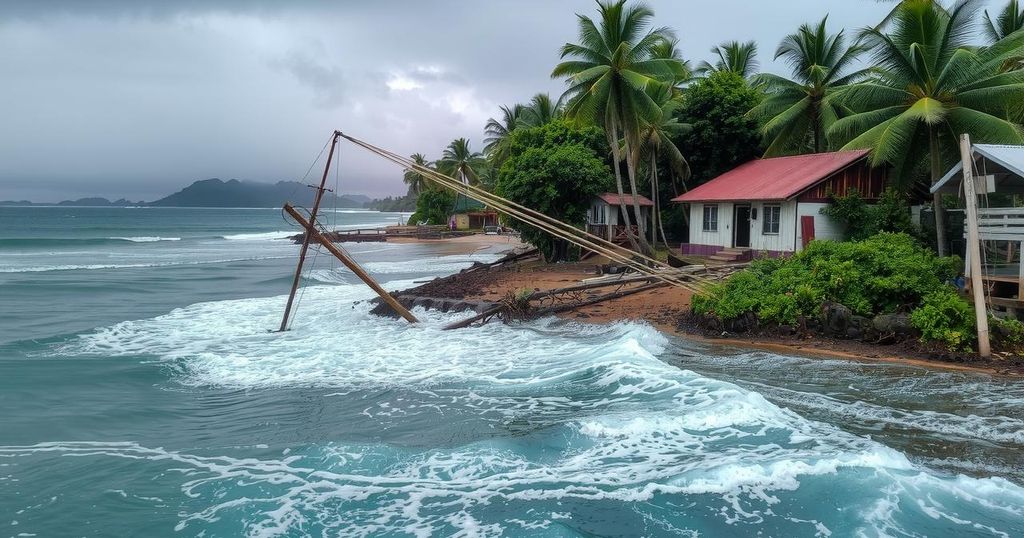Cyclone Chido Devastates Mayotte: Thousands Feared Dead
On December 15th, Cyclone Chido struck Mayotte, leading to fears of thousands of fatalities. Initial reports confirm at least 11 deaths, with hundreds more missing. The cyclone caused widespread destruction, complicating rescue efforts. Local officials and French aid are mobilizing to assist affected residents. Following Mayotte, Cyclone Chido impacted Mozambique, raising concerns for millions more in harm’s way.
On December 15th, a powerful cyclone, labeled Cyclone Chido, struck the French island territory of Mayotte in the Indian Ocean, with devastating consequences. Experts estimate that thousands may have lost their lives, as local officials report a suspected death toll that could reach the thousands when recovery efforts yield complete data. Despite the unofficial figures suggesting hundreds may already be deceased, rescue personnel have encountered significant challenges due to the extent of the destruction, hampering efforts to ascertain the true impact of the disaster.
In addition to the catastrophic loss of life, entire neighborhoods were reported as flattened, and infrastructural damage included uprooted trees and capsized vessels. The cyclone, categorized as a level four storm, recorded wind speeds nearing 140 mph. Approximately 320,000 residents reside on Mayotte, a region already identified as France and the European Union’s poorest territory, which complicates the recovery process due to existing impoverished conditions among many citizens. The situation remains dire, with officials stating that damage assessment and rescue efforts face delays due to adverse conditions.
Amidst these concerns, French President Emmanuel Macron has expressed his condolences to the residents of Mayotte and communicated that aid is being dispatched to support recovery efforts. Reports have revealed that as of the latest updates, at least 11 fatalities and over 240 injuries have been recorded, with many individuals missing. The local prefect, Francois-Xavier Bieuville, projected a severe outlook, estimating that the death toll could escalate, given cultural practices around burial and the difficulty in accounting for all affected individuals. In light of the unfolding crisis, over 70 facilities have been converted into emergency shelters to accommodate those displaced by the cyclone’s ravages.
Cyclone Chido did not cease its destruction in Mayotte; it continued eastward to Mozambique, where it further threatens the lives of an estimated 2.5 million individuals in its path. Although no official reports of injuries or fatalities have emerged from Mozambique, organizations like UNICEF remain actively involved in providing essential services to those impacted. Moreover, the ongoing tumult in Mozambique following recent elections may exacerbate the current humanitarian challenges, compounding recovery efforts in the region.
The French territory of Mayotte, located in the Indian Ocean, is prone to severe weather events, particularly tropical cyclones, due to its geography. Cyclone Chido represents one of the most violent storms to hit the area since 1934, causing unprecedented destruction and loss of life. With a population grappling with poverty and limited resources, the island faces significant hurdles in disaster response and recovery. The region’s socio-economic status further complicates aid efforts, as many residents live in vulnerable conditions. Understanding the broader challenge of natural disasters in impoverished regions is crucial to addressing the immediate and long-term needs in the wake of such tragedies.
In summary, Cyclone Chido’s devastating impact on Mayotte has led to a catastrophic situation, with expectations of a death toll potentially reaching the thousands. The island’s poor infrastructure and socio-economic conditions hinder effective recovery and rescue efforts, prompting urgent aid and emergency responses. As attention shifts towards Mozambique, where the cyclone has also caused concern, ongoing support and coordinated efforts are needed to assist those affected by these natural disasters.
Original Source: www.thetravel.com




Post Comment